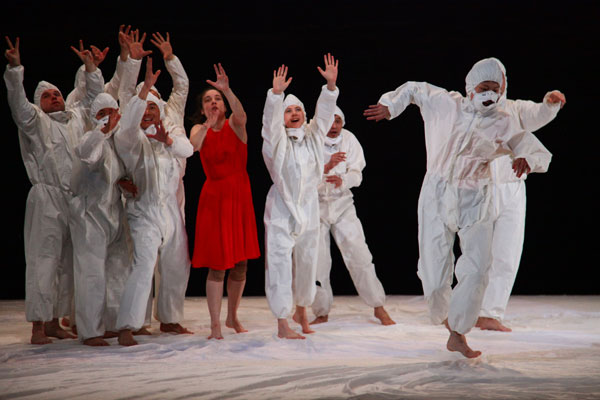German-Chinese play looks at individuals in the collective
Updated: 2015-03-23 07:32
By Chen Nan(China Daily)
|
|||||||||||
 |
|
Totally Happyis a theater production about the relationships between the masses and the individual, through actors' body language and monologues. [Photo provided to China Daily] |
He says that it was just a vague idea in the beginning. Later, with the help of the Goethe Institute in China, he expanded the concept of the play from one culture to another by working with artists from Munich.
The project started with interviews of people from both Germany and China, between 20 and 50 years old: How did you react when you first became a part of a collective? Can you recall the most impressive collective event you have experienced? What do crowds mean in fan cultures and at the public festivities like a music festival?
In different cultural contexts, Tian was surprised to find that the young generation of the two countries frequently mentioned the phrase "totally happy" when they were asked about being part of the masses.
"There isn't much cultural difference. The concept of the masses and the individual triggers powerful connections between the two countries," says Christoph Lepschy, one of the research consultants for Totally Happy.
Related lectures, workshops and open rehearsals have been conducted in the two countries. Last October, the play made its debut with the Munich Kammerspiele in Germany.
The production team was also excited to see the cooperation between actors of the two countries, who have no mutual languages and no shared cultural system.
"The German actors came from an established and mature theater while the Chinese actors are from an independent theater in Beijing. Their understandings about the theme are different. They communicated through a little English, body gestures and a translator," Tian says.
"The cooperation itself was about how each individual deals with the masses and how the masses treat each individual."
Related Stories
Court play staged in Shenyang Palace Museum 2015-02-19 14:58
Yimakan Shadow Play performed in Harbin 2015-02-01 08:15
Shadow play: lives on fingers 2015-01-14 09:52
Meng challenges audiences with Brecht's play 2014-10-27 07:45
Last Chinese Emperor's life as citizen featured in new play 2014-09-15 08:42
Today's Top News
Funding of AIIB will be open to other countries
ChemChina to buy Italian tyre maker Pirelli in $7.7b deal
Singapore former PM Lee Kuan Yew passes away
Mummified Buddha stolen from China: government
Russia, China to uphold WWII history
Sanctions linked to Minsk deal implementation: EU
Australia to invest A$3b in AIIB
Germany insists Greece must stick to bailout agreement
Hot Topics
Lunar probe , China growth forecasts, Emission rules get tougher, China seen through 'colored lens', International board,
Editor's Picks

|

|

|

|

|

|





